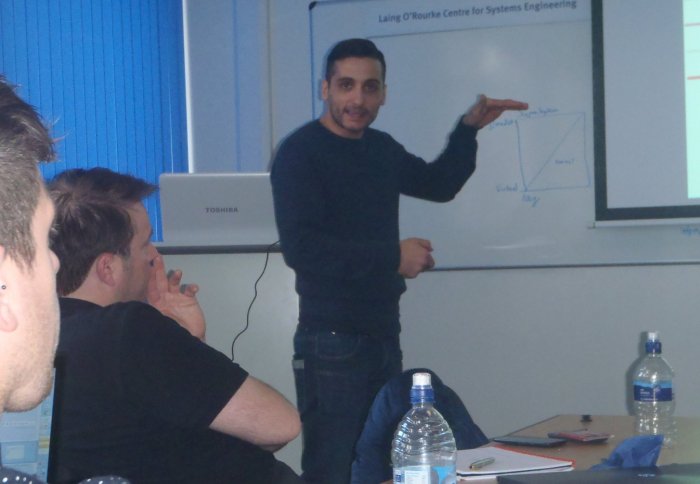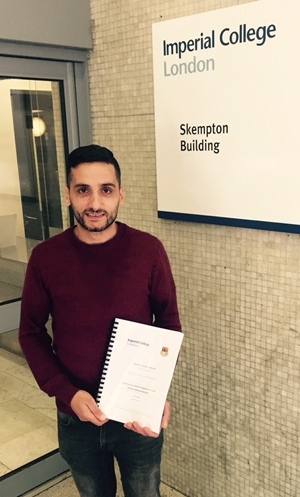Smart tech and the impact of Internet of Things in our day to day activities

MSc Systems Engineering & Innovation Alumnus Mr Elie Kfoury presents his research to colleagues on the programme
On Monday 15 February 2016, MSc in Systems Engineering & Innovation Alumnus, Mr Elie Kfoury presented his research to the current MSc Systems students. The students who are in their final year on the programme found the talk of great interest.
Elie, who during his studes at the Centre, was supervised by Professor Washington Ochieng. In his presentation titled "Smart technologies and the impact of Internet of Things in our day to day activities", Elie gave an detailed account of his experience on the programme and outlined his findings. An Abstract detailing Elie's research and his biography can be found below:
Abstract
Wireless Sensors Network (WSN) and Smart Meters (SM) have been popular in many ways and have been installed in many locations. They are both designed and conceived using the wireless technologies as their main ways of communications and data transfers; for that particular reason, their signals in transit are exposed to interferences and obstructions causing the whole operation sometimes to be jeopardised and susceptible for cyber-attacks. Based on that, the need of similar technologies are required to offer similar services with autonomous solutions and enhanced security level for monitoring and energy saving purposes.
One of the options is to use standard power socket as a mean to achieve the same monitoring and energy saving results by relying on the robustness of the existing power lines for data transferability. Surely the distances that the power lines cover in terms of signal and data transferability is more promising than the wireless systems, one of the reasons why the smart sockets capabilities may well be more promising; especially, when signals are needed extensively in harsh and hard to reach locations.
What has been proposed in this thesis is a new design built on the advantages of both technologies. Monitoring techniques and data transferability (down the power line) been used similar to that used for the WSN and SM, and tests been obtained to cover the user’s need.
Software and hardware components been explored to explain its fundamental and physical architecture. The new system is validated using Linux based operating systems, Onion microchip board and a combination of C++ language and Ruby and Cron scripts to run the program.
Taking everything into consideration, the principles of the system and its concept may well be vastly used for many different kind of energy saving and monitoring applications by achieving an overall better performance.
Biography
Elie Kfoury is an Electrical and Electronic Engineer with a BEng and MPhil in Fibre Optics and Photonics. As a part-time student he was able to establish his own business in home automation and saving energy technologies.
In 2013 Elie felt the need to boost his experience in order to enhance his business profile and to learn a bit more about systems engineering, specifically the advancement of technologies related to energy savings and automated controls. It is on the MSc in Systems Engineering & Innovation that Elie met his potential.
My stay at Imperial and studying for the course was a great experience and a lifetime achievement. The course was rich and offered a lot of knowledge by covering a large spectrum of modules related to systems engineering and innovation.
– Elie Kfoury
MSc Systems Engineering & Innovation Alumnus

Elie Kfoury
Article text (excluding photos or graphics) © Imperial College London.
Photos and graphics subject to third party copyright used with permission or © Imperial College London.
Reporter
Ms Alexandra J Williams
Department of Civil and Environmental Engineering